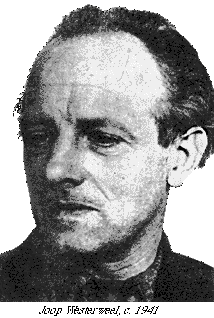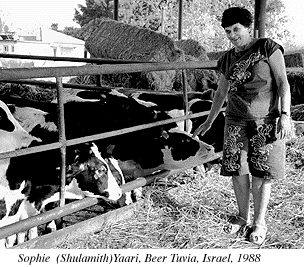Sophie Yaari Tells Her Story (conclusion)
Meeting Joop Westerweel: One Sunday Ruth and I were at home alone--everyone else was gone for the day. The doorbell rang. We didn't answer it; we were strictly forbidden to open the door to anyone. The front door of this house had a window from which we could see out, but no one could see in. Looking through the curtain, we saw a man with a child standing there.
 He rang again and again. Finally, he put a letter under the door, and went away. I opened the letter--that was not very polite, but I did it anyway.
He rang again and again. Finally, he put a letter under the door, and went away. I opened the letter--that was not very polite, but I did it anyway.
He wrote, "I will send you food coupons. I was here. Joop." That's all.
"I'm going to go and find this Joop" I told my sister. "He can help us."
"Don't go," Ruth begged me. She was afraid.
I left anyway, and walked and walked a long way, looking for him. It was a Sunday afternoon and the streets were full of people, mostly families on outings. But there were too many people, and I couldn't find him. I was very unhappy; I lost all hope. But then, as I walked back through the park, suddenly I saw him sitting on a bench, watching his son play.
He was unusual. If you saw him once you would always recognize him again. I had seen him only through the curtain, but I immediately knew it was him. I went over to the bench and looked at him. He looked back at me and said, "You are Sophie. Go home and I will follow you." At home, he sat with us for awhile. He told us everything would be all right, that he would be like a father and help us, and that we shouldn't be afraid. He gave us food cards, which we put in the envelope with his letter, to make it look as if he had never been there. He said someone would come for us in a few days to take us to another address.
Some time later, when I had been with a family in Rotterdam for a few months, I discovered that I was living on the same street as Joop Westerweel. Then I began to see Joop and his family quite often. All their telephone messages came to us because they didn't have a telephone. So I brought them the messages. Usually they were in some kind of code, and I couldn't understand them. His wife Willie was also very busy with the underground, often working late into the night. On weekends Joop was helping people go over the border to Belgium on their way to France.
Joop was not an ordinary person: he was something special. He was a pacifist; before the war, he refused to serve in the army. He did not pay taxes; he was against it. His brilliant word was "free." People must be free. Before the war he had gone to Indonesia to help people there, and in Indonesia he lived in the same houses with the poorest native people, not in the big houses where the rich Dutch were living, like the whites in South Africa. He was a fighter. He often said to us, "It's not important how long you live, but how you live." He said he would die on the barricades, not in a bed, and he did. He was happy doing that work.
Mirjam Waterman: It was Mirjam who asked Joop Westerweel if he would help us. He wanted to do something against the Germans, but not because he hated them. I can't say that he hated Germans--I don't know. His idea was that no one had the right to tell anyone else what they could or couldn't do. Everyone should be free to choose his own way. He wanted to help us not because we were Jewish people, but because of the injustice of the German policies against us. If we had been Hottentots he would have done the same--he would give his life. Mirjam would too, although Mirjam is the daughter of our people, the Jewish people.
It was a very good organization; there were people in the group who always knew where everyone was. At Doorn, where I spent several months, Mirjam sometimes came to visit and bring us things. She brought us life and hope; she was like a friend, even though we didn't know her too well. She wanted to know how the people were treating us, if it was all right staying there. Mirjam came, and her sister Ellie, too. I'll never forget it.
Mirjam was blond and didn't look Jewish. She had so many non-Jewish friends, she could have easily left and made a life for herself. But she didn't do that. She did not want us to fall into the hands of the Germans. She worked with the non-Jewish organizers as if she were not a Jew--with false papers. It greatly endangered her life, but she took on a big job, a great work, and she did it very well--she, her future husband, and her sister. We don't even know all the things that she and Menachem did, but they did a lot.
I have not had a normal life--sometimes I think I'm still like a child. I feel that I have lost many years, from the time when I left my house and parents in Emden. I always wanted to go back. I was searching for something I knew I couldn't find here in Israel. The first time I returned was in April 1965. I gave a talk in the grade school in Emden.
 I told the children, "I was a child just like you. I laughed here, I cried here, just like you. I loved this town. And then, suddenly from one day to the next, it was over. Girls who played with me, who came to my house and ate at our table, suddenly said, 'I'm not playing with you anymore. You are Jewish.' That was so strange."
I told the children, "I was a child just like you. I laughed here, I cried here, just like you. I loved this town. And then, suddenly from one day to the next, it was over. Girls who played with me, who came to my house and ate at our table, suddenly said, 'I'm not playing with you anymore. You are Jewish.' That was so strange."
I invited the children to ask me questions. I found out that their parents had not told them that there had been a thousand Jewish people living in their town, that they had been an important part of the community, and that many non-Jewish people had worked for their businesses, and in their homes. They didn't tell that generation anything--they knew nothing. Only one child asked me a lot of questions. Then he said, "The Fuhrer also did many good things. He gave people work and he built the autobahn." That's what those children had been taught. That made me very angry.
Sophie was liberated on November 23, 1944 in the south of Holland. The German occupation continued in the north for nearly six more months. It was not until the following May that her sister Ruth also came safely through the long years of war. Their parents and most of their relatives in Germany perished in concentration camps.
Sophie's friend Paul who decided to leave Sophie and her sister to go off on his own, had spent the night in a bunker near the train station. Jews escaping from roundups frequently hid in these bunkers, so it was a place where the Germans often looked. He was picked up and arrested, sent first to Westerbork, then to Auschwitz where he died.
Sophie emigrated to Palestine directly after the war ended. Today she and her husband run an innovative dairy farm, part of a cooperative that has been studied and emulated by agriculturalists from many countries.
Sophie Yaari gave this interview in her home in Beer Tuvia, Israel, on April 11, 1988.
 I told the children, "I was a child just like you. I laughed here, I cried here, just like you. I loved this town. And then, suddenly from one day to the next, it was over. Girls who played with me, who came to my house and ate at our table, suddenly said, 'I'm not playing with you anymore. You are Jewish.' That was so strange."
I told the children, "I was a child just like you. I laughed here, I cried here, just like you. I loved this town. And then, suddenly from one day to the next, it was over. Girls who played with me, who came to my house and ate at our table, suddenly said, 'I'm not playing with you anymore. You are Jewish.' That was so strange."
 He rang again and again. Finally, he put a letter under the door, and went away. I opened the letter--that was not very polite, but I did it anyway.
He rang again and again. Finally, he put a letter under the door, and went away. I opened the letter--that was not very polite, but I did it anyway.